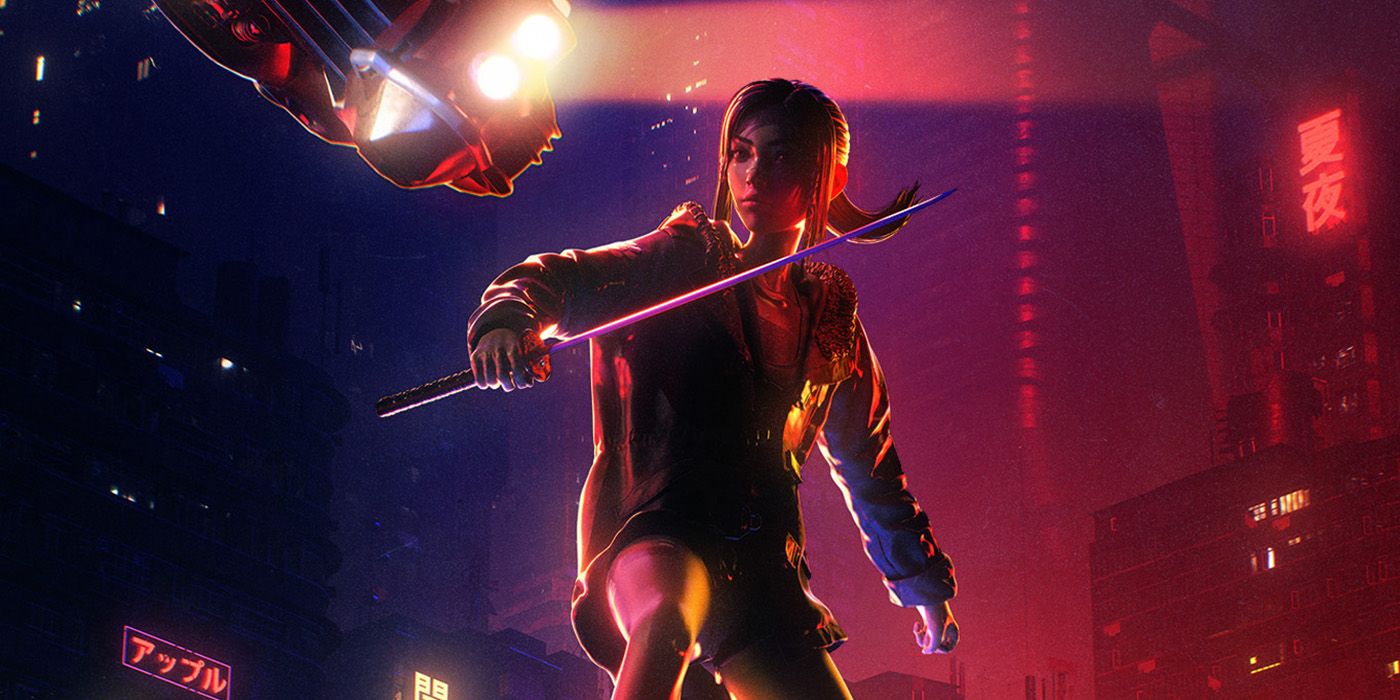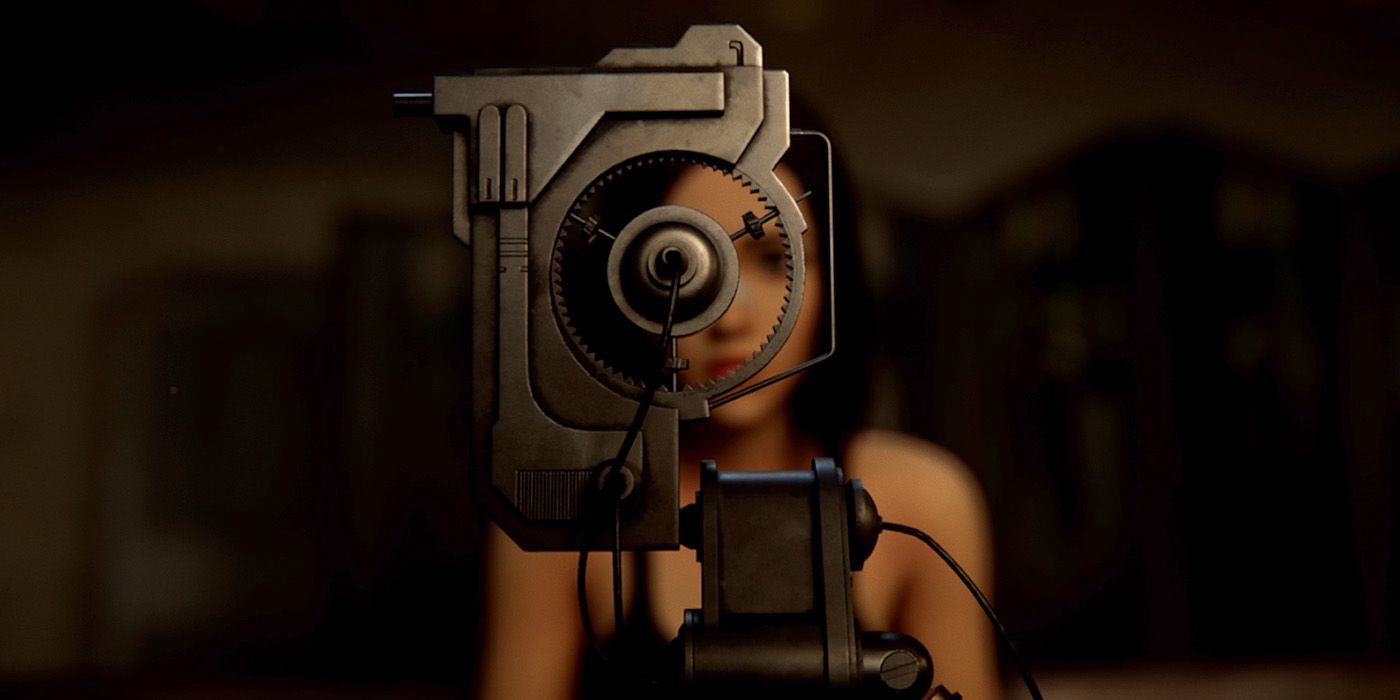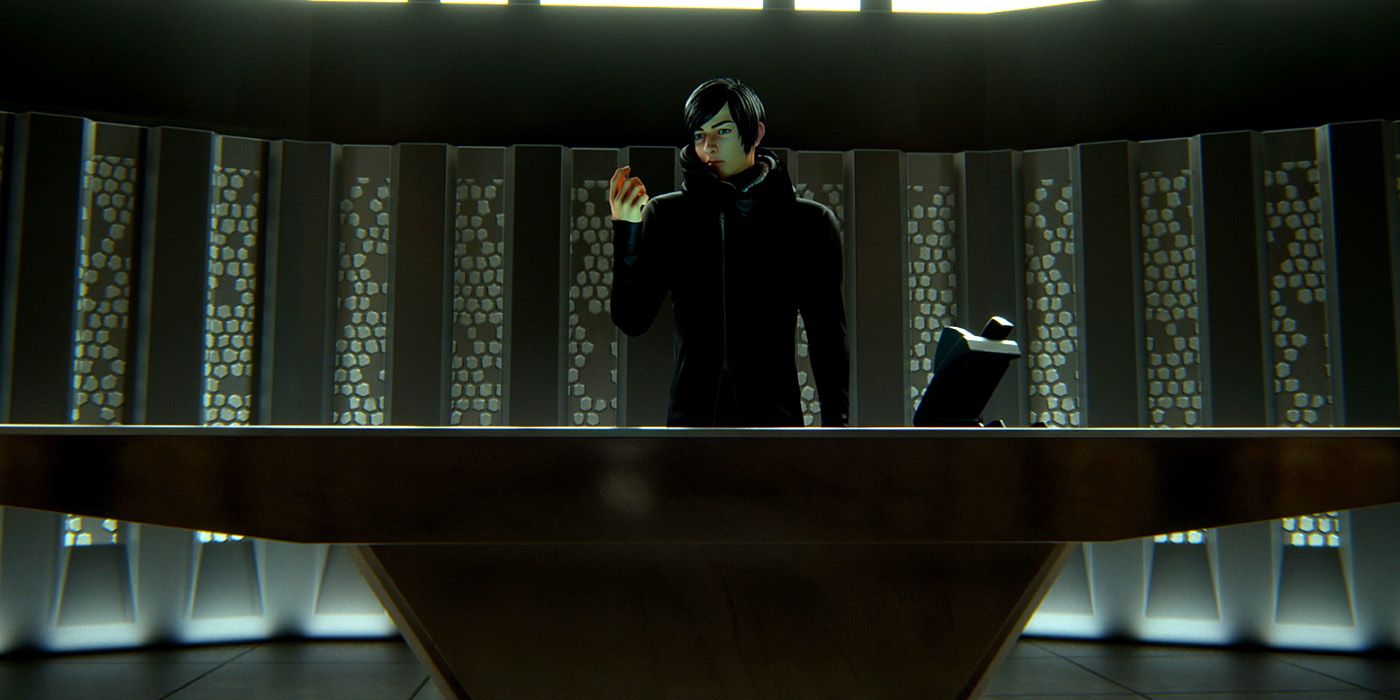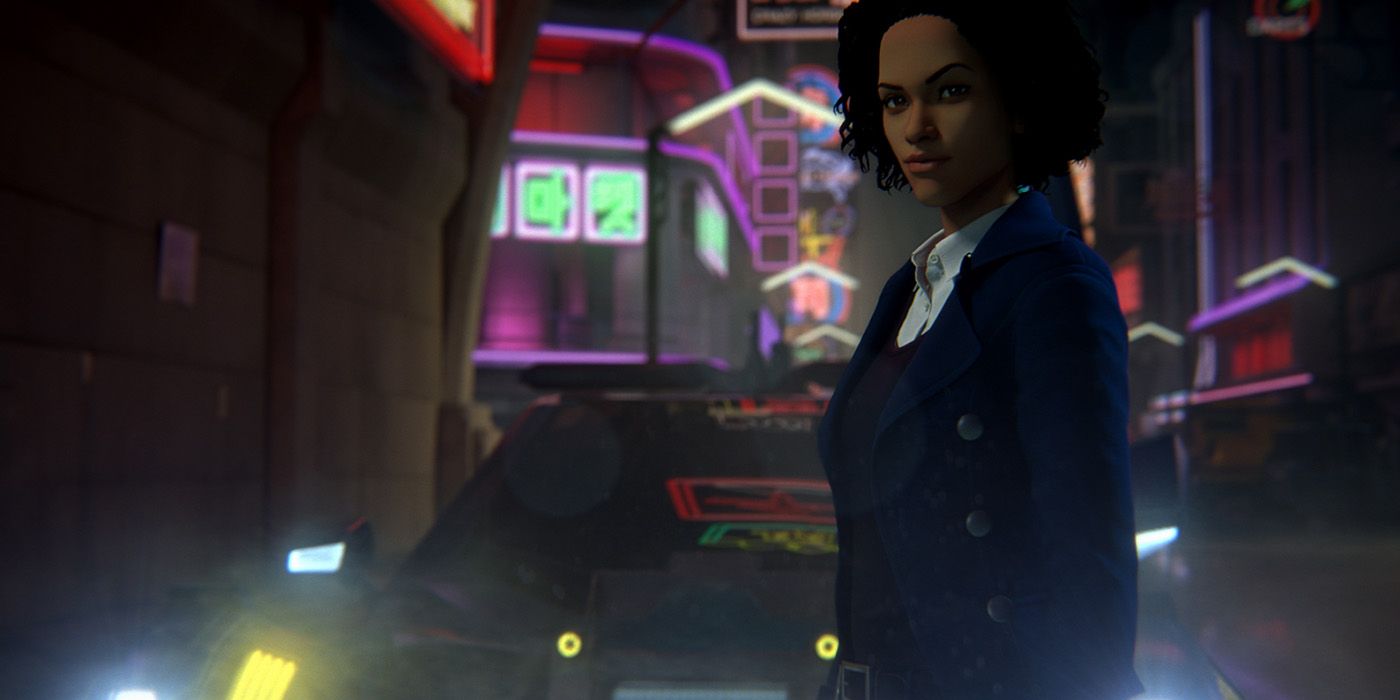Blade Runner: Black Lotus is set in Los Angeles in the year 2032, 10 years after the events of the anime short film Blade Runner Black Out 2022. The show centers on Elle, a young woman who wakes up with no memories and whose only clues are a locked data drive device and a tattoo of a black lotus. Elle must team with junkyard owner Joseph to solve the mystery of her amnesia and hunt down the people responsible for her brutal and bloody past.
Ahead of the series' premiere, Screen Rant took part in a press conference with Blade Runner: Black Lotus co-directors Shinji Aramaki and Kenji Kamiyama and executive producer Joseph Chou to discuss the anime series, with Chou translating for the Japanese-speaking co-directors.
Joseph, you've said that in creating this CG world, you had to figure out what a Blade Runner anime would look like rather than simply just creating a CG version of this world. What did you mean by that and how did you, collectively as a team, decide on the look? Was your time spent together working on Ghost in the Shell, which was an anime that was inspired by Blade Runner, helpful in creating this CG universe?
Joseph Chou: It wasn't really about what we were trying to do with it, it's really what might be expected of us because those are pretty big clothes to fill, you know. When someone enters in, it needed to be something that could be recognizable for someone to say, "Hey, that's Blade Runner." But how do we get there with the format that we're in was was the big question. It's one thing to think about when you're doing 2D animation, but when you're in CG animation, that's a different question.
I think when it comes to CG, we have a spectrum of going very toon or we can go very what you would call photoreal. But either one was not a good choice and we had to fall into the right spectrum and also have the kind of look that's evocative and that's unique for us. It was a pretty difficult thing to do so there was a lot of development that went on with this one and especially the series. We had a lot of content that we had to put out.
Kenji Kamiyama: So obviously, Blade Runner itself was a very revolutionary movie. It has the neon signs, the dark alleys and rain-soaked streets and it wasn't the squeaky clean sci-fi that we were used to back then. So it really was a huge shock, especially to lots of animators, how there are a lot of Japanese signs which was actually quite interesting from Japan's perspective. They weren't necessarily correct Japanese, but they were very endearing.
Because the city itself, the environment itself, the look of it is a major character in Blade Runner and they have to do it right, so it's one of the things that you really have to think about when tackling it. As for the question about Ghost in the Shell, it's interesting because Ghost in the Shell indeed was inspired by the drama that was really spun out of Blade Runner, but I actually did Ghost in the Shell first and then came into this world, which is quite an interesting way to do it.
But the question of identity, the question of what is human memory, all these things were important questions that were covered in the world of Ghost in the Shell as well. But it is something that originated from Blade Runner and you have to find an angle how that could be presented more interestingly in this version of Blade Runner that I got to direct.
Shinji Aramaki: For me, the points that Kamiyama has raised in terms of the neon signs and just the rain-soaked streets and whatnot was an important thing. But also something that they had to constantly think about was they're doing something new in a long-form because it is a series that's never been done before and we have to do a long story. When trying to bring in new elements into this, when it comes to look or action or anything that they did, they constantly had to think about, "Will this be accepted by the Blade Runner fans? Will this be accepted as something that's going to be called Blade Runner-esque, that fits in the canon?"
It's something that we really struggled with, finding the right balance of it. When thinking about the Ghost in the Shell, obviously both are the cyberpunk genre and they kind of evolve into different strands in a sense. For me, I came in later than Kenji because he came in for the CG series, and determining that look, they went in another direction. So in a way, it does [raise] a lot of the same questions that the cyberpunk genre would usually ask, but they do exist in a different plane, even in the same genre. So for us, it wasn't as much of a challenge trying to do something different, it was just doing justice to the properties of the franchise itself was the bigger challenge.
How do you think that the show will speak to the global historical moment we're in with corporate consolidation, advanced capitalism, climate change, given that cyberpunk seems less far off than it did in the 80s when the movie came out or the 60s when Phillip K. Dick's book was written?
Joseph Chou: Well, it's surreal, isn't it? The movie from the 80s is almost a commentary on the contemporary society that we live in. I think Blade Runner covers a lot of themes that are relevant to current society, such as the class struggle. Obviously, there are no replicants yet, but you could also kind of look at it as a racial issue almost in the world of Blade Runner. Then there are issues of the corporations taking over the society and really impacting the lives of people living in it and environmental problems.
So I mean, there are a lot of relevant issues that we could cover in this property and it was more relevant than ever and it is something that was centered in our minds when we were trying to find this series while not losing our focus on this being entertaining as well. So we have to have an entertaining tale, a character that people care about and who needs to live in this world and lived through it and tackling all these issues that that you've just mentioned in the world of Blade Runner.
Kenji Kamiyama: Obviously the Blade Runner franchise itself deals with all the issues that you've mentioned, but for me, one thing that was most poignant was about the corporation, a giant corporation would use this technology to take control of society. At the same time, that brings into question what is the worth of human life and what is the meaning of human life? It's not something that I wanted to tackle directly, but it just came naturally because of how the story is set up. Like the Wallace Corporation with their attempt at trying to control the replicant technology and trying to control the labor and the means of economic productions and whatnot. It just naturally came as I was working on it. Basically the theme of the story itself just kind of seeped out as I was tackling and it's really something that came naturally as I was doing it.
Shinji Aramaki: For me, obviously the point of this storytelling is to deliver entertainment and deliver some kind of catharsis to the audience watching by having an emotional investment of the characters that are in the world. But because the character is a female replicant, it deals with other issues, they can be understood as a gender issue, it could be a discrimination issue, and a lot of these things that you have to struggle with.
It's the first time to really have a female protagonist for the franchise, but in trying to create a piece of entertainment, these kinds of themes naturally came out. It's something that you have to deal with because of where we place the character and how we decide on what type of character we wanted to have as a protagonist and that protagonist drove the struggle, the story. But the way the world is in this setting, in this universe, she has to struggle against all these challenges and overcome them. I guess that naturally sort of became reflective of what's going on these days in the world.
Looking at the original film and the recent follow-up, Blade Runner 2049, there's a sense of it being a very cerebral sci-fi story. When you're expanding it into this format and making it a little bit more action-oriented, do these two things naturally go together, or does it present a challenge?
Kenji Kamiyama: So obviously, this is a series and so it is a very different format from movies and you have to tell the story over many, many episodes. So there are a couple of things going on where you have to deliver something that's entertaining, that'll have people keep people coming back. However, Blade Runner is not an action drama, so you have to be very mindful of it, but at the same time delivering the suspense and delivering a visceral feel to it so that people would come back and would want to stay with us throughout the series, it's a very different type of storytelling.
At the same time, the films are about one character's personal journey, it's rather a personal discovery, and you can't have the entire series just doing that because you'll run out of story to tell and it's very hard for people to then focus on just one character and that person's journey. So you have to bring in some other factor into it, which was also then trying to make it bigger. It's not just about the replicant, it's not just about the Blade Runner, but let's talk about the side of the Blade Runner, let's talk about the story of the replicant, let's talk about their conflict.
The structure of the conflict was touched upon in the films, but basically corporations against individuals, there's also that structure. So you have to really think about how to bring that into the center so that there's something more that will intrigue people and have people really want to be invested in the storytelling itself of the series.
Shinji Aramaki: So another factor to consider while directing the series was it is a wonderful franchise and it is a wonderful universe to play in, but what is the point of the series being done as a CGI animation? One of the things that we thought was the utility for this was to really kind of expand, not just try to be faithful. But you have to deliver what the essence of Blade Runner was, but if we're trying it in a new genre, in a new medium, then maybe one thing we can contribute is to try and expand the drama and also maybe serve as an entry point.
The original film is more than 30 years old and then there's Blade Runner 2049, but you need to really experience both films. But there are audiences out there who have not experienced this real-time like they did, so perhaps this could serve as an entry point is one thing that I thought about. So in order to do that, we thought about what could we do here and action might be it. Then it was what kind of action that we want to use and what kind of entertainment do we want to provide?
Blade Runner: Black Lotus airs new episodes on Sundays on Adult Swim.




